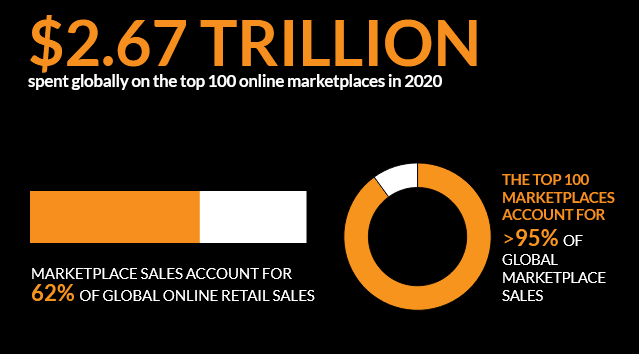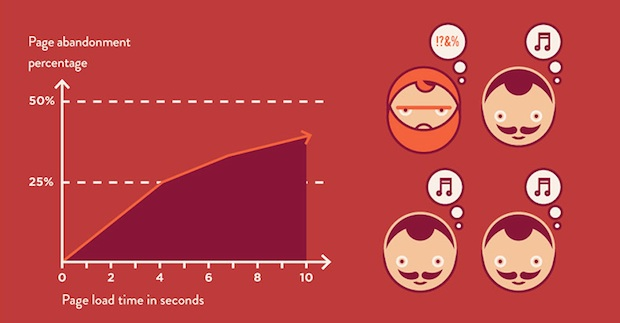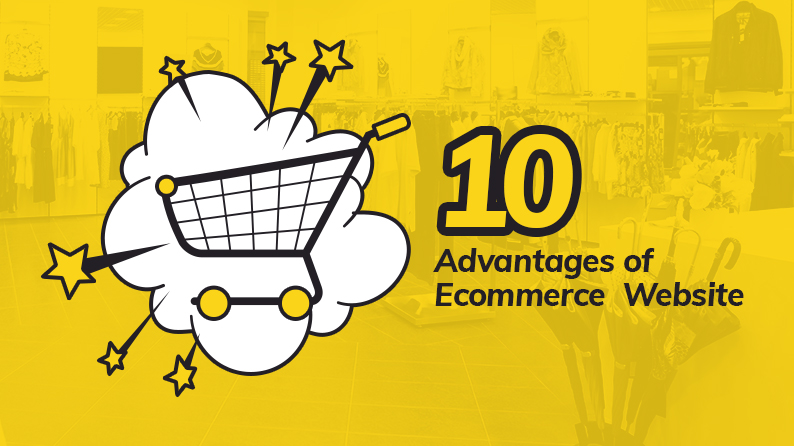Amid the pandemic, we have witnessed a dramatic uptick in eCommerce sales accelerating the digital transformation process for businesses worldwide. In 2020, the total retail sales on top eCommerce multi-vendor marketplaces reached a mammoth USD 2.67 trillion while the gross merchandise sales grew by 29%, according to Digital Research 360ÔÇÖs analysis. Several multi-vendor marketplaces around the world, like Etsy in the USA or Ozon in Russia, grew by nearly 100%.

Image source: Digitalcommerce360
Entrepreneurs or business owners want to keenly invest in a multi-vendor store, citing rapid growth. Although it is a profitable business idea, starting a marketplace requires a careful understanding of which multi-vendor ecommerce software or solution is sustainable as per your business requirements.
Table of Contents:
- Building an Online Marketplace
- Questions To Help Select Right Multi-vendor Software
- Features & Functionalities Questions to select a multi-vendor software
- Performance & Security Questions when selecting a Multi-vendor Software
- Pricing & Support Related Questions to Select a Multi-vendor Software
- Summary
Building an Online Marketplace
Poor understanding of the potential eCommerce business opportunities leads to modest or almost negligible outcomes. Therefore, a pragmatic approach and a clear intent directed towards leveraging digital capabilities to attain a more substantial omnichannel presence is the need-of-the hour.
At the same time, many emerging businesses or entrepreneurs believe that coding a website from scratch is the best way forward. This is rarely the case. There are several ready-made marketplace software that require no development skills to create an online multi-vendor store. These multi-vendor software decrease your time-to-market and allow you to focus on core business strategies and goals like attracting new sellers or advertising, rather than platform development.
When evaluating the available options, choose a multifaceted enterprise-level multi-vendor platform or software that offers a cohesive, consistent, and compelling experience to users (admin, vendors and buyers).
This article contains a list of selective parameters to help you evaluate the right multi-vendor ecommerce software to build a successful online marketplace.
Questions To Help Select the Right Multi-vendor Software
Q: Should you choose a standalone multi-vendor software or a multi vendor plugin?
| What are Standalone Multi-vendor Software | Multi-vendor Platform Plugins |
|---|---|
| Standalone multi-vendor software are inherently designed marketplace solution with all the key features and modules pre-integrated to start an online marketplace. | A multi-vendor plugin is an add-on built by third-party developers to introduce online marketplace abilities to an already existing eCommerce stores. |
| Benefits: Standalone multi-vendor software solutions provide autonomous capabilities to marketplace owners to successfully manage and streamline eCommerce operations. The benefit of using a standalone marketplace software is reliability, flexibility, ease of use, and more. | Benefits: The cost of multi-vendor plugins and apps is relatively low. They can be easily integrated with existing solutions to build an online marketplace. For example, you can convert a Shopify store or a WordPress Store into a full-fledged marketplace using third-party multivendor plugins at an additional monthly fee. |
| Challenges: There are a few challenges associated with standalone multi-vendor ecommerce software as well. For instance, the total cost associated with setup, configuration, and overall maintenance (such as optimization of software performance over the years, minimizing errors, and ensuring zero downtime) of the marketplace can go out of budget. | Challenges: Many users report that plugins create a poorly designed marketplace with weak product management solutions and tons of bugs |
Q: Which one is best, hosted or self-hosted multi-vendor platforms?
| What are Hosted Multi-vendor Software | What are Self-hosted Multi-vendor Software |
|---|---|
| With no concern of buying hosting and server, Hosted multi-vendor platforms allow business owners to kick-start their multi-vendor eCommerce operations in no time | Self-hosted eCommerce solutions are more flexible and provide full access to source code for implementing customization of any kind. |
| Benefits: The cloud-based eCommerce platforms provide a bundle of enterprise-level features such as product inventory, SEO tools, and more. Also, you get continuous upgrades and customer support. | Benefits: Self-hosted multi-vendor solutions provide complete control to the admin, ensuring alignment with confirmed business strategies. You have the freedom to set up your multi-vendor marketplace on your choice of domain with full data security. |
| Challenges: There is a fixed fee (monthly/yearly) that you must pay to use the software to run your multi-vendor eCommerce business. Moreover, since you do not control the source code, customizations are limited, and integration to an existing CRM (Customer Relationship Management) or ERP (Enterprise Resource Planning) system is a hassle. | Challenges: Freedom also means that you (or your team) are responsible for managing the marketplace or installing/configuring any security updates provided by the eCommerce solution. Moreover, any limitation in terms of space or speed of your hosting service provider may quickly hamper your marketplace performance. So, it is imperative to choose a reliable hosting service provider for efficient operation. |
| Verdict: The choice between hosted or self-hosted depends upon individual business requirements. | |
Read more: Which eCommerce Multi-vendor Platform Is Right For Your Business?
Q: What is the scope of customization and scalability in multi-vendor software?
Customizable eCommerce multi-vendor software empower business owners to seamlessly incorporate future integrations and add improvements to an existing online store as per the changing demands/requirements. Before deciding on an eCommerce multi-vendor solution of your choice, it is crucial to understand the scope of customization it offers.
To ensure how customizable a multi-vendor ecommerce software is, check whether:
You get access to the source code: For businesses with unique products or processes, choosing a multi-vendor platform or software with access to source code ensures adaptability over time. Such a solution provides flexibility to cater to immediate and future business requirements.
Or whether the team delivers customized solutions: Some multi-vendor marketplace platforms are easy to customize as compared to others. Browsing through their case study or portfolio page may offer insights into the solutionÔÇÖs customizability. Also, it is equally important to check the levels of customization, i.e. whether it was done at the design level, feature level, or completely personalized to fit a particular niche/industry. Such information will help make informed business decisions.
Further, you may even check the software framework documentation and terms & conditions for better clarity.
To keep up with the changing retail landscape and prepare for exponential growth, scalability is another potent factor for consideration. A scalable, responsive multi-vendor solution delivers a robust marketplace with sustainable growth. To ensure scalability, check whether the platform infrastructure is easily extendable to implement future extensions. Or how many products can the software support? This will help you get a better understanding of the multi-vendor solution.
Other Questions on Technical Stack and Software Usage Policies
Interact with the solution provider team and get insights into the framework, programming language, or the complete technical stack behind the multi-vendor eCommerce solution. This will help you manage the platform with ease. Also, policies pertaining to the use of eCommerce software once purchased should also be considered. For instance, hefty processing or transaction fees on a purchased, licensed solution donÔÇÖt augur well with the business growth.
Features & Functionalities Questions when selecting a Multi-vendor Software
Q: Does the multi-vendor software offer mobile apps and other mobile commerce features?
Today’s customers are more likely to interact and shop online using a mobile phone rather than a desktop. Even Google has shifted to a mobile-first indexing approach for the whole web.
So, when evaluating the multi-vendor eCommerce platform for your online marketplace needs, check whether the solution is equipped with mobile commerce modules like responsive design, multilingual support, and ready-to-launch buyer apps. This will help your business drive incremental growth by leveraging the mobile capabilities of today.
Read More: Bridging the gap between sellers and customers with mobile apps
Q: What are the marketing features the Multi-vendor software has to attract buyers and sellers?
Apart from the extensive mobile commerce features, marketing is another aspect that is vital for business growth and scalability. Marketing features are ideal for an online marketplace to build awareness, increase sales, and even provide an additional revenue stream for the marketplace owner. Solutions that equally emphasize delivering substantial marketing features offer greater ROI as opposed to solutions that donÔÇÖt.
Below, we have listed a few must-have marketing features for a multi-vendor software:
- Social media integration with Share and Earn feature to leverage the power of word-of-mouth advertising. An effective tool to increase both customer acquisition and retention through incentives.
- In-built affiliate marketing module to reward affiliates (with a fixed commission fee) in exchange for brand advertisement and increase in sales for the business.
- Pay-Per-Click (PPC) advertisement module enables sellers to advertise their products or storefront on the homepage banner while the admin earns for every single click.
- Dedicated blog integration module to publish engaging/relevant content targeting the right audience and generating potential business leads.
Moreover, there are several enticing features such as bulk discounts, buy-together products, purchase rewards, and many more to intelligently upsell/cross-sell products in a multi-vendor marketplace.
Launch Your eCommerce Marketplace Swiftly With Yo!Kart
Q: How does the Software allow payments flow between sellers & marketplace owners?
By default, any payment for orders in a multi-vendor marketplace must flow directly from buyers to the marketplace owner or adminÔÇÖs bank account. This way, customers make only a single payment for individual orders, and funds received minus the commission fee is transferred to the sellerÔÇÖs account by the admin. This is how the payment flow should work between sellers and marketplace owners.
Also, when multiple orders are placed simultaneously, keeping a manual track of every transaction becomes a hassle. For instance, imagine 10 individual transactions involving separate users at different geographical locations occur concurrently in a marketplace. In such situations, automated solutions such as Stripe Connect or PayPal Payout are required for real-time split payments.
So, make sure your ideal multi-vendor eCommerce platform or software is equipped with split payment API like Stripe Connect and provides the correct flow of payments.
Q: How does the multi-vendor software handle/manage shipping and taxes?
Generating shipping labels, providing live shipping rates, or generating order tracking numbers – the entire shipping management process is an integral part of eCommerce business operations. Without a reliable shipping management module, it is impossible for the admin to streamline the entire order fulfillment process, including last-mile delivery. Most successful marketplaces have a well-defined shipping management module to ensure hassle-free tracking and shipment delivery.
Similarly, tax management is another important module that allows businesses to manage individual state taxes and comply with regional tax policies. For an eCommerce business, it is imperative to collect sales tax on individual products/services and operate effectively in a region.
Complying with individual state taxes and streamlining the order fulfillment process are two crucial aspects for an eCommerce business.
An ideal multi-vendor ecommerce software is one that allows the admin to handle both shipping and tax management operations manually as well as automatically via external integrations. These integrations could be either pre-integrated or embedded as a plugin in the marketplace. Yo!Kart multi-vendor software comes pre-integrated with ShipStation and Tax Jar APIs.
Q: Can I integrate my existing business or third-party APIs with the Software?
If your business utilizes an existing CRM or ERP system, then your multi-vendor eCommerce platform should allow integration with these systems to ensure seamless business operations. Evaluate and check with the solution provider/technology partner whether it is possible to integrate your existing business or third-party APIs like a preferred payment gateway, popular shipping software, and more with the platform. If customization is required, ask whether the team behind the solution offers the same or not.
Performance & Security Questions Related to Multi-vendor Software
Q: How secure is the software?
There are several security measures such as encrypted framework, SSL Compliance, GDPR compliance, third-Party payment processing, and more, that determine the reliability of a particular solution. For an eCommerce business, such security measures must be strictly implemented because a breach of any kind can be hugely damaging, as consumers may lose trust in the brand. A security-focused multi-vendor eCommerce software prevents hackers from exploiting any vulnerabilities that may hamper your online business.
Q: Can the Software handle million of products without affecting loading speeds?
Nearly a decade ago, the Amazon team calculated how a delay of just 1 second in page loading speed would cost them an insurmountable $1.6 billion in sales. Considering the widest range of products offered by Amazon today, these numbers could be even more extravagant. Thankfully, their platform is well-equipped and capable of handling such excessive sales in real-time.

Image source: FastCompany
Hence, it is important to evaluate whether the multi-vendor software that you are going to buy can handle millions of products without experiencing downtime. See if the team behind the multi-vendor solution can provide a demo for the same. This is where actual scalability is tested.
Q: How many concurrent users the multi-vendor software can handle?
Usually, multiple buyers transact and possibly place orders on an eCommerce marketplace at any given time. This makes it vital for a business owner to evaluate how many concurrent users the multi-vendor software can handle. Yo!Kart, for instance, provides support for over 250 concurrent users out-of-the-box.
Pricing & Support Questions Related to Multi-vendor Software
Q: What is the total cost of ownership (TCO)?
From software license, hosting fee to yearly maintenance cost and upgrades, TCO includes all costs and expenses during the entire life-cycle from the date of license purchase. Since every business operates on a pre-determined budget, it is imperative to ensure that no hidden cost is associated with the purchase or post-implementation process.
For instance, in addition to the licensing cost, some multi-vendor marketplace software may charge a hefty monthly fee for third-party apps, optimization, technical support, and maintenance. You should evaluate these recurring costs before making a pivotal decision when selecting a multi-vendor eCommerce solution. This may save your TCO from quickly going out of budget.
Q: What is technical support policy?
The multi-vendor software provider must offer technical support (free or paid) for handling server-side scripting errors, logical bugs, API integration errors, and other issues. Read all the technical support policies carefully and ask appropriate questions such as how to connect with the team for support, what issues are covered inside the support policies, what if there is a violation, what are support channels, and more?
To ensure seamless multi-vendor store operations, reliable technical support at the initial stage is a must.
Summary
The journey of every successful eCommerce marketplace starts with a digital roadmap and a scalable multi-vendor ecommerce solution on which the marketplace is built. A flexible, scalable multi-vendor software that uses an agile delivery model delivers sustainable online multi-vendor store with support for global expansion. To determine your business enjoys rapid digital transformation and scalability, choose a robust multi-vendor eCommerce platform with industry-leading capabilities.



